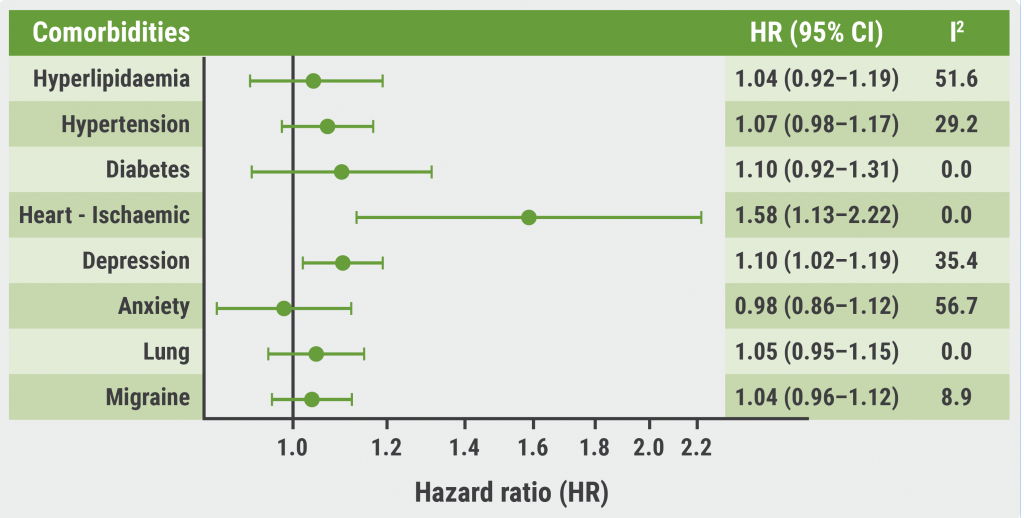Patients with MS often suffer from sleep disturbances, but therapeutic options targeting sleep in these patients are scarce [2]. A pilot study examined the effect of exogenous melatonin on sleep quality and sleep disturbances in MS patients. Patients with MS and confirmed sleep disturbances (n=30) were randomised 1:1 to a dose-escalating regimen of melatonin (0.5–3 mg, oral, once daily) or placebo for 2 weeks. Patients followed the opposite regimen from weeks 2–4. Sleep time and sleep efficiency were measured with an actigraphy device. Furthermore, several sleep-related patient-reported outcomes (PROs) were recorded. Dr Wan-Yu Hsu (University of California San Francisco, CA, USA) shared the results.
The total sleep time was significantly longer in the melatonin group (mean 6.96 hours) compared with the placebo group (mean 6.67 hours; P=0.03). Moreover, sleep efficiency was numerically higher in melatonin users (84.7%) versus placebo users (83.2%). Mean improvements on the Insomnia Severity Index (ISI) (melatonin -3.5 vs placebo -2.4), the sleep quality component of the Pittsburgh Sleep Quality Index (PSQI) (-0.03 vs 0.0), and the Neuro-Quality of life-Fatigue questionnaire (-4.7 vs -2.4) numerically favoured melatonin users (see Table).
Table: Results of objective outcome measures and PROs in MS patients receiving melatonin or placebo [1]

HADS, Hospital Anxiety and Depression Scale; ESS, Epworth Sleepiness Scale; ISI, Insomnia Severity Index; MSWS-12, Multiple Sclerosis Waling Scale – 12; PROs, patient-reported outcomes; PSQI, Pittsburgh Sleep Quality Index; SEM, standard error of the mean.
- Hsu W-Y, et al. Effects of melatonin on sleep disturbances in multiple sclerosis: a pilot study. P881, ECTRIMS 2021 Virtual Congress, 13–15 October.
- Freal JE, et al. Arch Phys Med Rehabil. 1984;65(3):135–8.
Copyright ©2021 Medicom Medical Publishers
Posted on
Previous Article
« “Expanded Disability Status Scale 0 is not normal” Next Article
WNT9B-gene variant associated with doubled relapse risk in MS »
« “Expanded Disability Status Scale 0 is not normal” Next Article
WNT9B-gene variant associated with doubled relapse risk in MS »
Table of Contents: ECTRIMS 2021
Featured articles
Preliminary data shows positive results of ATA188 for progressive MS
COVID-19
MS patients at risk of hampered immune response after vaccination
Immunotherapy in MS does not influence COVID-19 severity and mortality
Anti-CD20 antibodies associated with worse COVID-19 outcomes
ECTRIMS-EAN consensus on vaccination in MS patients
Experimental Treatments
The role of astrocyte phenotypes in acute MS lesions
Promising results of intrathecal MSC-NTF cells in progressive MS
Preliminary data shows positive results of ATA188 for progressive MS
Evobrutinib reduces relapses and MRI lesion activity
Primary endpoint of opicinumab for relapsing MS not met in AFFINITY trial
Elezanumab did not outperform placebo in progressive and relapsing MS
Ibudilast reduced retinal atrophy in primary progressive MS
Treatment Trials and Strategies
ECTRIMS/EAN Clinical Guidelines on MS treatment: an update
Rituximab most effective initial MS therapy in Swedish real-world study
Ublituximab meets primary endpoint for relapsing MS
Dynamic scoring system aids decision to switch MS therapies early
Long-term suppression of MRI disease activity with ocrelizumab
Stopping DMT: when or if at all?
Biomarkers
Early predictors of disability progression in paediatric-onset MS
High-sensitive biomarker detection in MS via novel ELISA assay
Cortical lesions predict cognitive impairment 20 years after MS diagnosis
Applicability of sNfL measurement in clinical practice
MRI more sensitive for disease activity than relapses in SPMS
Imaging
Changes in GABA-receptor binding among cognitively impaired MS patients
T2 lesions independently predict early conversion to SPMS
Natural killer-like CD8+ T cells as a reservoir of clonal cells related to MS activity
Neuromyelitis Optica Spectrum Disorder (NMOSD)
Eculizumab, satralizumab, or inebilizumab for NMOSD?
Long-term efficacy of satralizumab for NMOSD
Long-term efficacy data: inebilizumab for NMOSD
Progressive MS
Charcot Award 2021: Progressive MS, a personal perspective
Top score poster: Meta-analysis on the effect of DMTs
Cortical lesions predict disease progression and disability accumulation
Ocrelizumab shows long-term benefits in primary progressive MS
Other
WNT9B-gene variant associated with doubled relapse risk in MS
Melatonin associated with improved sleep quality in MS patients
“Expanded Disability Status Scale 0 is not normal”
Personality trait alterations in MS patients
Related Articles
December 9, 2021
T2 lesions independently predict early conversion to SPMS

November 18, 2024
More comorbidity is associated with worse clinical outcomes in MS
November 25, 2020
Disease activity during pregnancy in a modern MS cohort
© 2024 Medicom Medical Publishers. All rights reserved. Terms and Conditions | Privacy Policy
HEAD OFFICE
Laarderhoogtweg 25
1101 EB Amsterdam
The Netherlands
T: +31 85 4012 560
E: publishers@medicom-publishers.com

